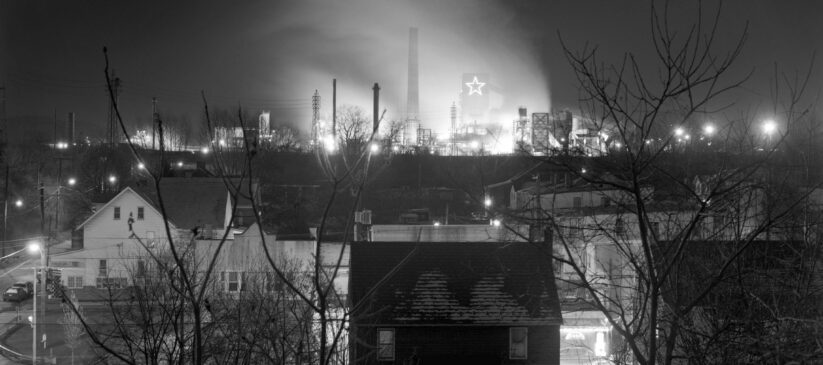
BETHLEHEM, PA – On March 28, 1998, the Coke Ovens Division ceased operations, being the last of the Bethlehem Plant primary operations to close. Located on 160-acres, between Hellertown and Bethlehem, the Coke plant employed over 500 people at the height of production.
Bethlehem’s Coke Plant dated back to the Schwab years of Bethlehem Steel. Seeking a more cost-effective source of coke for the Blast Furnaces and gas for the Plant’s gas-fired heating furnaces, Charles Schwab signed a contract with German firm Didier-March, a technologically advanced company who had innovated the coke making process. Didier-March began building the plant in 1910 and became operational in 1912, with the first of 300 ovens eventually constructed. During the midst of WW1, Kaiser Wilhelm II made an offer to purchase Bethlehem Steel and its assets. Charles Schwab declined the offer, furthering strengthening ties with the Allies. By 1917, Didier-March sold its coke operation to Bethlehem Steel for $8 million. In the 80 years that followed, Bethlehem Steel maintained, updated, and modernized the Coke Plant, which was central to their integrated plant operations.
The Coke Ovens Division served as a pipeline for a variety of immigrants seeking employment at the Bethlehem Plant, supplementing employees from the surrounding Lehigh Valley. Housing for some of the earliest immigrant employees was established on the grounds of the Coke Ovens in 1923. This first settlement was called the ‘Labor Camp’ and it consisted of barracks and two-family frame dwellings. Laborers from Mexico soon followed and were joined in the workforce by others from Cuba, Puerto Rico, Spain, and various Eastern European countries. Many of their families joined them and went on to settle predominantly on Bethlehem’s Southside.
Nearing the end of the 20th century, the mines, divisions, and subsidiary companies of Bethlehem Steel were sold off to make up for declining corporate revenue. One by one, the departments inside the Bethlehem Plant were shut down. The Blast Furnaces made iron for the last time in 1995, the Structural Mills closed in 1995, the Combination Mill stopped rolling in 1997. Then, on March 28, 1998 it was time for the “flame” to go out at the Coke Ovens.
In 1998, the last superintendent of the Coke Ovens Division, Charlie Luthar expressed, ” You realize that the place was shutting down forever and there would never be an operation like this again. All of the friends that you have made over so many years were going to go all different ways. No longer were we going to have a single unit. That was really emotionally hard.”
But that’s not exactly how it went.
Only six months after the closing of the plant, more than 200 former Coke Oven employees gathered at the Silver Creek Athletic Association in Springtown, PA at the first reunion since their division closed that March.
There was a certain comradery felt at this “far end of the Bethlehem Plant,” Charlie Luthar, stated that summer, “It was a close-knit working environment.” John Zamper, one of the retirees attending summed it up best: “It was family. One word, family!”
The Annual Coke Oven Reunion has continued each year since the closing of the plant. It is an employees-only event, although Plant employees from other departments are also welcome.
On September 16, 2023 former employees will celebrate their 25th Annual Coke Oven reunion. These reunions are well attended and open to all former steelworkers from the Plant with pre-registration. Further details about the reunion event will be released via the National Museum of Industrial History website in early Summer 2023.
Additionally, the National Museum of Industrial History will be hosting its annual Steel Weekend and Steelworkers Reunion on September 30th and October 1, 2023. Steel Weekend 2023 will focus on mining as well as marking the anniversary of the Coke Oven closing through a variety of lectures, programs, exhibits and demonstrations. Details can be found at nmih.org/steelweekend. Those interested in learning more about the steel industry can visit NMIH on Wednesday through Friday 10am-5pm to explore the Museum’s Iron & Steel Gallery. More information can be found at nmih.org.
Note to Media: Interviews with key former Coke Ovens Employees are available. Please contact Andria Zaia for more information at [email protected]. Image credit/caption is “Coke Works, Bethlehem, PA, circa 1993″, photographer Joseph Elliott, courtesy of the National Museum of Industrial History.”
Background information on the Coking Process:
Metallurgical coke is produced by baking bituminous coal in a series of slot-type ovens comprising a “battery” of ovens. At its peak, there were 5 batteries totaling approximately 500 ovens in operation at the Bethlehem Plant. During the coking process, which could last from 18 to 106 hours depending on production levels and reach oven temperatures as high as 2,000 degrees, the coke produced became almost pure carbon. After the coking cycle for each oven was completed, the oven doors were removed and the hot coke was mechanically pushed from the oven, quenched with water to extinguish the flames and cool it to allow further handling. It was then loaded onto railroad cars to be taken to the Blast Furnaces, other customers, or placed into storage. Gases driven from the coal during coking were processed, collected, and sold for use in manufacturing a diverse array of products from cosmetics to fertilizer. The cleaned coke oven gas was used in heating the coke oven batteries and various gas-fired furnace throughout the Bethlehem Plant.
About NMIH
A Smithsonian Institution-affiliate, the National Museum of Industrial History is dedicated to preserving America’s rich industrial heritage. Housed in an 18,000-square-foot, 100-year-old former Bethlehem Steel facility on the largest private brownfield in America, the Museum is home to exciting exhibits, engaging programs and amazing history. Learn more at nmih.org.
Media Contact:
Megan Pildis
VP of Business Development
National Museum of Industrial History
610-428-3053 (cell)